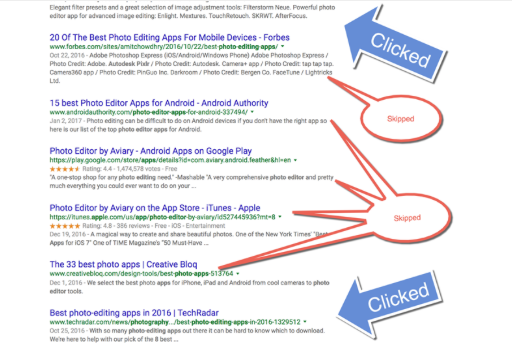Listen to people as they search To discover the things behind the words people search for, Wil recommends that you sit with people as they search online, encourage them to voice what’s going through their minds at each click, and listen. If you were in the moving business, that kind of insight could help you see what content people want and don’t find. Your page might rank in the top five, but that doesn’t mean people will click it. Let Google tell you what people want Search engines are getting good at understanding what content people want and what content they find disappointing. Discover the types of content people typically search for Google, for example, often pulls a bunch of related information onto the results screen based on the things people predictably search for on a given topic. Here’s an example: When people click through to your website, you want them to find answers to lots of their questions. Go down the list of questions, and create answers that people will value – maybe even enough to point others to your pages. When you search some phrases you want to rank for, check out the lists of related search terms at the bottom of the results pages. People searched Google to find out what was going on. “They did nothing,” Wil says.

What would you give to read your customers’ minds? In his talk at the Intelligent Content Conference, self-proclaimed “search guy” Wil Reynolds shared some tips for getting as close as possible to mind-reading by using resources – some timeless, some modern – that are hiding in plain sight.
“If you look just at the keywords people search for, you’re missing out on many of their actual needs,” says Wil, who serves as director of digital strategy at his own company, Seer Interactive.
This article sums up some things Wil urges marketers to do to become more empathetic – “to understand the people behind the searches” – so that we can focus “not on being ranked but on being thanked.”
Talk with people
Wil’s first piece of advice is so obvious that it might seem to go without saying: Talk with people. Why start here? Because marketers “have ruined some parts of our jobs because we haven’t taken the time to understand how to sell things to people. We have all these cool tools and platforms that we can just throw stuff into, and they tell us what to do.”
Having worked as an SEO professional for almost two decades, Wil describes his “rebirth” this way:
One day I woke up and I looked at all the years and all the time that I spent trying to understand how Google ranks things. I was so out of whack. I had spent all this time chasing what Google wanted and where they wanted the words and never tried to understand how people make the decisions they make.
Wil cites the example of Michelin’s travel guides in the early 1900s when travel by car first became a possibility. Michelin tapped into a widespread craving for trustworthy travel-related information. The company somehow identified that need and filled it without the help of the internet.
Referring to Claude Hopkins’ book Scientific Advertising, published in 1923, Wil reminds us that we could learn a lot from yesterday’s door-to-door marketers who learned about their customer’s concerns through conversation.
We say, ‘Oh, I have to optimize for the word SEO blah, blah, blah so I can rank for SEO blah, blah, blah, blah, blah.’ We forget that there was a need that somebody had before typing in that word. How do you understand the need if you never talk to people? The answer is you don’t. You make assumptions, and that’s a mistake when you can just talk to somebody.
We lose something important when we act as though moving into the digital age means abandoning the human connections that have always made marketing work.
HANDPICKED RELATED CONTENT:
Listen to people as they search
To discover the things behind the words people search for, Wil recommends that you sit with people as they search online, encourage them to voice what’s going through their minds at each click, and listen.
Wil points out, for example, that Chinese-American people who follow the principles of feng shui often base home-buying decisions on factors that keyword research can’t tell you. Certain aspects of a house – like location on a dead-end street, stairs facing the door, front and back doors that line up – are deal-breakers.
If you had a real-estate business, typical SEO keyword research might result in a decent Google ranking for your website, and yet, if you didn’t know about these feng shui criteria, a portion of the people clicking through to your web pages might not rent from you … and you might never know why. If you don’t sit with some members of the Chinese-American audience, listening to their thought process as they click through a search experience, you have no clue about the concerns that determine their decision-making. You can’t know how to adapt your content to address their needs.
You’d be getting ranked but not getting thanked.
Another example Wil gives comes from conversations he had with people as they searched online for moving advice. Two people he talked with clicked through to the same BuzzFeed article, which had seemed promising but disappointed them. He listened to why they were disappointed. One person found the advice “lowbrow.” Another said that the information would have been more helpful in a checklist format.
If you were in the moving business, that kind of insight could help you see what content people want and don’t find. That’s the kind of content all of us want to create.
How much better would your content strategy be if you asked potential buyers of your product or service to search, and you watched how they search and asked them what they like and don’t like about the existing content that’s already ranking? You could then build content that answers people’s questions better.
Wil observed, to my surprise, that people often skip over the top-ranked search results. Your page might rank in the top five, but that doesn’t mean people will click it. Someone looking for a recent report, for example, may skip to a title that cites a year. In the example illustrated below, the searcher who skipped to the bottom link was drawn to blue text that included “2016.”
That’s the kind of information you need when you create your content’s title tag – and you get it when you sit with people.

Marketers can waste a lot of effort chasing a ranking that, in the end, fails to deliver clicks. Better to chase an understanding of the human beings doing the clicking by sitting next to them and opening your ears.
Let Google tell you what people want
Search engines are getting good at understanding what content people want and what content they find disappointing. The good news for digital marketers? Search engines lay out, for all to see, much of what they learn. Our task is to know what we’re looking at. “I’m showing you things that have been staring you in the face,” Wil says, “things that you were blind to.”
Here are some of the ways search engines reveal priceless information that enables you to discover what people want.
Discover the types of content people typically search for
Google, for example, often pulls a bunch of related information onto the results screen based on the things people predictably search for on a given topic. Here are the results that came up when Wil searched for surf information on North Carolina’s Outer Banks. The five red circles represent five types of information…

COMMENTS